Dreams to Come: Lydia and and the Future of The Handmaid's Tale Franchise
After the series finale, the franchise will be moving forward with an adaption of The Testaments, the sequel to Margaret Atwood's original book. It will follow an elderly version of Aunt Lydia during the middle Gilead period, a time when piety, radicalism, and obedience have become the norm. It's difficult to reconcile the Lydia we read about in the novels and the Lydia in the series. Some fans believe it's impossible, and in many ways it is.
Their backstories are different. Testaments Lydia was a family court judge who believed in liberty, equality, and democracy. After congress was slaughtered, a group of young men burst into the courthouse and threw her into a van. They broke her down with forced confinement, sensory deprivation, and starvation until she felt a sense of loyalty to her captors. It was a common brainwashing technique--one that she herself seems to have mastered.
Once she had proven her loyalty, she was introduced Aunt Vidala, Aunt Helena, and Aunt Elizabeth--a group that she quickly dominated. They became the founding aunts, tasked with building a separate women's sphere of government. They came up with uniforms, laws, prayers, and rituals--the groundwork for much of the female system we've come to know in the franchise. The reason Commander Judd was credited for this work in the novels was because he claimed their ideas as his own and used them to gain clout with the other commanders. They had as much influence on the formation of the system as the rest of the Sons of Jacob. Lydia was proud that she had accomplished so much in so little time, but she was wholeheartedly ashamed of what she was doing. She didn't sign up for the task of indoctrinating and oppressing her own gender. She was never blinded by rhetoric. She wrote much of that rhetoric herself, and she took great pleasure in the fact that she was able to slip in references to female empowerment and paganism. It was her own personal form of humor.
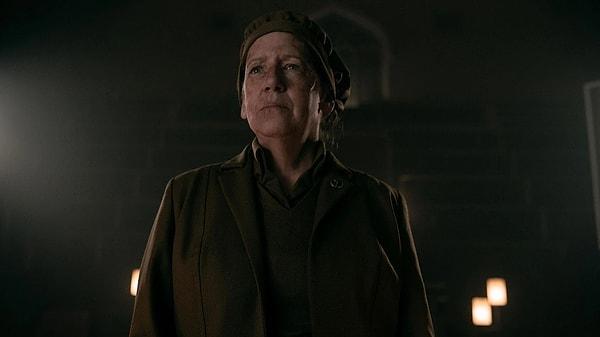
Courtesy of Hulu
There was a point in the early days when Lydia allowed herself to join the bandwagon. She recognized that it would be better to persecute others than to be persecuted herself. She absorbed the teachings of the regime, and she gave in. But she didn't give her heart to Gilead, and she wasn't a blind extremist. It was a shallow acceptance of a sect she didn't even fully understand--built out of a conscious effort to be counted among the faithful in a world where only the faithful would be allowed to live.
That is absolutely not the case with the Lydia we know from the series. She did work in family court, presumably a judge--or possibly in child services, but she moved on to become a schoolteacher, where she crossed professional boundaries and befriended her student's mother, Noelle. She gave her the education and urging she needed to live a righteous life, similar to what she did when she became an aunt, and when Noelle refused, she contacted child services. It represented a compulsive need to impose her Christian values on others. She tried to convert the girl, pressing her to attend church and accept Christ. She told her to stop carrying on with men, and she challenged her to take better care of her son--who she was quite concerned about.
It seemed as though she was born to be an aunt, and at that point, she was already indoctrinated. Gilead had invaded child services under the guise of privatization. They ripped the child out of the home after a single phone call, and when they conducted an interview with Lydia at the school, they inquired about whether or not Noelle attended church. Lydia didn't see anything out of the ordinary. In fact, she seemed to appreciate their new way of doing things. There were other signs of her indoctrination as well. When she confronted Commander Lawrence about Putnam's crimes against Esther, she insisted that the ceremony was sacred. It was blessed by God, and she was very matter-of-fact when she said that. She also questioned Esther about whether or not she had done something to lead Putnam on, even unwittingly---under the presumption, of course, that such a thing would've invalidated Esther's claims of being violated. In modern America, that kind of conservatism hasn't seen the light of day for decades. Testaments Lydia would've known the truth the second she received Esther's test results, but not the Lydia we see onscreen.

Courtesy of Hulu
Turning Two Into One
There was speculation from the beginning of the series that some of the believers were actually secret dissidents, working with Mayday to bring the government down. We did see econo-people, commanders, and their wives running safehouses, quietly smuggling handmaids and marthas across the border. Moira and June both had run-ins with smugglers early on, and the handmaids in season 4 were able to find shelter in a commander's home. But Lydia didn't seem to be among them. Every single thing that she did, in public and in private, was a testament to her faith. She even cried when she rang the bell announcing June's pregnancy, a sign that she had been touched by the struggle to end the fertility crisis. That may have been how she gained her posting as an aunt.
As far as we can tell, she wasn't the founder of a separate sphere of government. The characters that helped build that sphere--Aunt Vidala and Aunt Helena--are not present in the series. One of them, Aunt Elizabeth, has been named. She does appear often and has since the series started, but she's not special, and she doesn't hold a significant role. Most viewers don't even know who she is.
After seeing Lydia pray and express her Christian sentiments in flashbacks, it can be assumed that she regularly attended church. Sometimes pastors like to lay things on thicker than usual, adding in skits, lighting, and fog machines, passing the collection basket around three or four times during service. They'd switch from basic hymns to guitar riffs and compelling vocal performances and draw out their sermons longer while they expanded opportunities for involvement--perhaps a para-military camp to turn young men into God's warriors, women's talks on fertility and righteous living, and political gatherings for the men. She'd be swept up in rhetoric, and they'd pull out all of the stops to make sure that the congregation was inspired. We don't know if any of this is true, of course, but if she was a brainwashed extremist, that is the path they would be led down.

Courtesy of Hulu
The difference between these two women couldn't be more important. One is a fervent believer who gave her mind, body, and soul to the theocracy. The other was a pragmatist chosen for her background in child welfare and law, and she was never on board for the regime change. She made do. She joined in, played the part, and at times she convinced herself. That is a far cry from what we've seen in the series. That gap will have to be closed if the Lydia we see onscreen is going to complete her mission in the spin-off.
It's not going to be easy--at least it wouldn't be in the real world. Lydia has been hard-wired, controlled by a shift in language, years of rhetoric, and brainwashing. Those old thoughts would be like habit, creeping in, taking control, pulling her back to her old ways. She'd have no reference point for normal. If she wanted to move forward, and she somehow found the strength to make that step, she wouldn't be able to, because she wouldn't know where to go. Everything around her would pull her back in, and she'd find herself where she started.
Usually, when someone changes in this way, it's because of a life-altering event, like a divorce, a death, or something catastrophic. People will turn their heads in the other direction, start to think, and then maybe they'll go down another path. They won't get there right away, and they have to fight, climbing over boulders and crossing obstacles. It's not a well-paved road. It's a deer trail, a thin line in the grass. If you look at it from the wrong angle, it'll disappear, forcing her to keep reorienting herself, mind her thoughts, and keep her priorities straight.
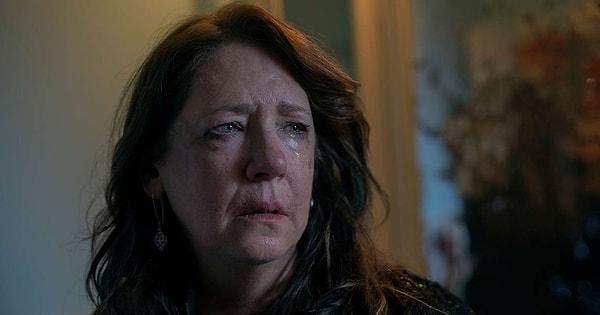
Courtesy of Hulu
And Then There Was Light
Ann Dowd's performance in the hospital this season was an inspiration. She was like a predator, letting her eyes flick across the room before nearly knocking Esther out of her bed, and when she knelt down beside Janine, ready to lay her heart out in prayer, it was possible--if only for a moment--to believe that Lydia could change. Sometimes, in moments of desperation, we become pliable, and that is exactly what happened with Lydia. It was the antithesis to the confinement Gilead uses to brainwash others. Instead of being denied of her basic needs--interaction, food, and stimuli--Lydia was forced to face the world without the person she loved.
Ann Dowd addressed this in her most recent press racket. She said that Lydia had been lying to herself--consciously, in fact--justifying her crimes and telling herself that she was doing God's work. But she was perfectly aware of what was actually going on. She's not dumb, and she does have a moral compass. She knows that handcuffing someone to a lit stove and gouging eyes out is wrong. She also knew what the commanders had been doing behind the scenes, and it bothered her long before June spoke up about it.
She actually believed that God was unhappy with her and that He wanted her to change her path. She said so. She just couldn't bring herself to make that step, because she believed in Gilead and what they were fighting for. But when you love somebody, and you see them getting hurt, those barriers drop. Those lies fall away. Light creeps in and you turn back and you start to second-guess your trajectory. Janine's moment in the hospital was the life-changing event that Lydia needed to shift her perspective, and it was so beautiful to see, because she truly cares. She wants to do what's right. Deep down, she is a kind woman who thought she was saving the world. That's what this regime was supposed to accomplish. Gilead twisted her instincts, turned her moral compass around, and had her believing that she was a soldier in God's fight. Everything about her, her militant sense of purpose, her refusal to compromise, and her heavy hand, all reflect that.
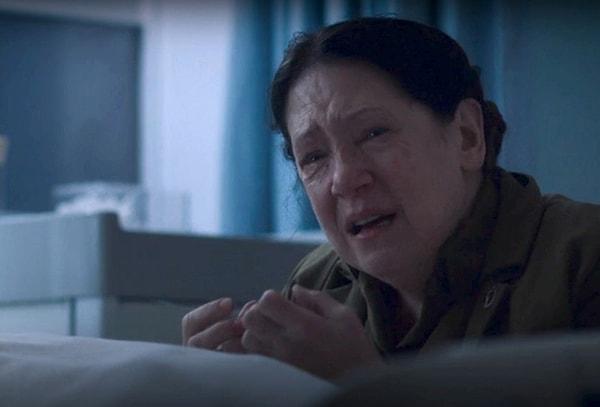
Courtesy of Hulu
Hobbling Along
There's a moment in the season 5 finale when Lydia is climbing the stairs in the red center, and she stops. The girls were singing 'It's The Hard Knock Life' while they were scrubbing the floor in the room above. It made her so happy she was almost brought to tears by it. Never have we ever seen that look on her face. It was like meeting a changed person. They must've done something with her makeup because it was visible. She was different somehow. We see her trying, moving forward, and finding her way.
Bruce Miller was asked about this in a podcast, where they talked about Lydia's arc. They wanted to know if she'd find redemption, and this has come up quite a bit in the fandom. He said that progress has been made, and that's impossible to miss. If we were to ask her about all of the things she hated about Gilead, we would nod in agreement. But he said that if we were to ask her all of the things that were working in the country, we'd be horrified. Remember, this is the woman that reverted back to her old excuses the second Janine woke up. She talked about how she was trying to give her girls the education they needed. It was almost as if she'd just walked out of a 4-hour church service.
This shift might not have been as extensive as we thought, and in some ways, it might be further along than we think. She's known about the commanders and their affairs with the girls for some time. She initially trusted pious men to act with honor behind closed doors. But she has eyes. It was the same with the corruption on the council. She probably looked up to her pastors and church leaders in the time before, and that attitude would have transferred over into the regime change. She must've had faith that they would do the right thing. Now they're enforcing the rules, but only when it's convenient. Ann Dowd was quick to point out that Lydia knows exactly why Commander Putnam was put to death. It had nothing to do with Esther and everything to do with New Bethlehem.
Lydia signed on to this fight so she could save the world from moral decay, infertility, and the greed that nearly killed the planet. Now she's beginning to see that there's something very wrong with Gilead. It's rotten, and it's hindering their original goal. She doesn't want to bring down the nation. She likes the idea of Gilead, and she is not going to give up. That's something we will begin to learn about her. When she's pushed down, just like in the most recent season finale, she's right back on her feet with murder in her eyes. At some point, Lydia decided that she needed power--more than that, she needed a weapon. In season 4 when the other aunts tried to force her into retirement, she made a midnight visit to Commander Lawrence's house. There she confessed that she had 'testaments' to his crimes, including his collaboration with June.
It was something of a shock because the Lydia that we have been watching for 5 years would've normally grabbed a whistle. She had proof of Angel's Flight--the most egregious crime ever committed in the country's history. She also knew about Emily and Nichole, which will continue to hold significance if the sequel is any indication. Why didn't she just run to the authorities?
She started to collect secrets about the other commanders and their wives. In The Testaments, she becomes one of the most powerful people in Gilead. The aunts act on her behalf as a secret society, gathering paternity records and gossip, storing them in the innermost chambers of Ardua Hall. She was a listener. The other commanders could tell her anything they wanted, and she would be discreet, so long as she was kept safe--a caveat that she'd mention indirectly so as to avoid being too straightforward.
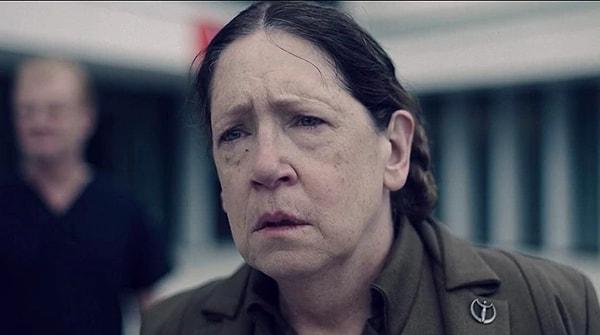
Courtesy of Hulu
In The Testaments, Lydia's ability to blackmail the commanders allowed her to pressure them into voting, push them out, and even have them killed. They knew exactly what she was capable of, but she made contingency plans to have their secrets revealed in the event of her disappearance, and she knew that they would foresee that. It was a genius move, but it seemed so uncharacteristic of her. She was always pushing her moral code, walking the straight and narrow, and there were so many instances where she exhibited pathological naivete.
It begs the question: is she acting? Is she really as dense as she seems? The answer to that might be nuanced and complex. In Commander Lawrence's office, she essentially orders him to pull all of the handmaids out of the home, and he tells her that pious men need their kink. He said, surely she must've known that.
She froze. Doesn't she know what sexual repression does to the psyche? For many audience members, it's as simple as one plus one; not for her. Aunt Lydia chooses to see what she wants to see, and she has some serious blind spots. But at some point, she became aware that these men were dangerous. Perhaps it was when she was with June in the prison, ready to tear her hair out after being blamed for sending her girls out to be abused and violated. That was Lydia's first, visible step towards enlightenment. Was that when she started gathering information or was she crafty enough to start early on as a means of protecting herself and building up power? She does seem to like to be in control, and there are times when she has exhibited a strategic mindset, adapting to each situation to suit her purposes. Sometimes when she's with the wives, she takes the role of a saleswoman. When she first met Serena and saw her picking up a file, she couldn't help but remark on what a fine choice that handmaid would be. She sold Janine to Mrs. Putnam, and she's great at cowering when she's with commanders. She's not the most charming person, but she has her way.
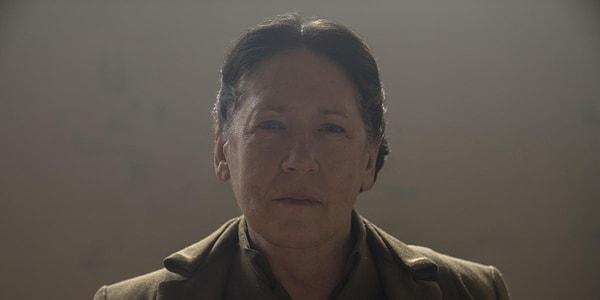
Courtesy of Hulu
In The Testaments, Lydia was the one you never saw coming--unless you'd tarried with her before. She used flattery, and her do-gooder persona as a facade to veil her true intentions. But when you got her alone in the right situation, you'd see a completely different side to her. There was a certain expression she'd get, like a cheat about to reveal their secrets, or an angry woman ready to slap a man in the face. She'd give a curt smile, shift around, then shock everyone in the room with the perfect checkmate. It was easy to imagine when reading the novel, but we didn't see it onscreen until she confronted Lawrence. That was the first time they merged the two Lydias together.
What we're seeing now is a woman who can move beyond the ambiguous morality we saw in The Testamants. It's not about power for her; it's about the girls, and the fact that Testaments Lydia never took that standpoint was somewhat painful. She didn't mind losing a few here or there, especially if it was for the greater good--not this Lydia.
This woman has an army of handmaids stationed in every home, taking notes, and running to her with gossip. Even high-ranking commanders wouldn't be able to hide from that. That's why she told them that they would be tested by wicked men, and when they were, she would be there to listen. That's power.
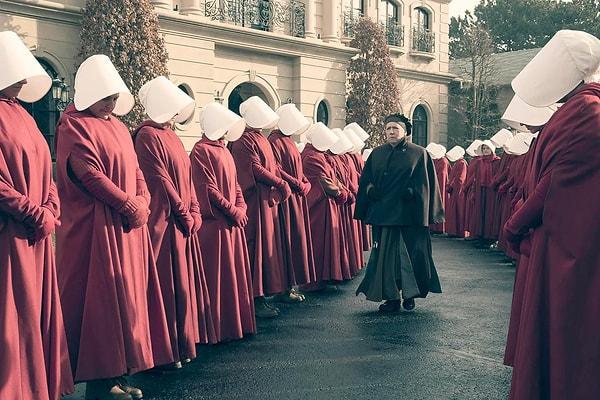
Courtesy of Hulu
The Real Lydia
How many great leaders are born in a generation? How many Caesars and Alexanders? What about Stalin, Hitler, or Mao? How do you not look at their efforts, regardless of how evil or disgusting they were, and marvel at what they had done--the sheer magnitude and genius of it. Stalin had such total control over the country that he was able to hunt down any dissident, even if they never voiced or acted on their beliefs. Mao was the master manipulator, who somehow organized one of the most violent campaigns in the world, and he still commands the fealty of the masses, even to this day.
Testaments Lydia might not have been perfect, but she was still able to build true political power. It was her picture at the back of every classroom, not theirs. She was the conscience of Gilead, asking people, 'What would Aunt Lydia want you to do?' Marthas would warn children to be good, or Aunt Lydia would come for them when they were sleeping. Her image became a lasting force in the country. It took on a life of its own. In many ways, she was the closest thing to a leader they had. That takes unimaginable prowess and cunning, well beyond what most humans are capable of. Yes, she killed--unjustly, mind you. Yes, she tortured, maimed, and disfigured innocent young women. According to the sequel, she inspired enough hate to have her head paraded on a stick through the streets, and she was the first person to admit that.
But that angry, do-what-you're-told attitude was just another mask that she wore. In the book, she was really trying to burn the whole thing to the ground. In the series, she's become something we'd never expect from a believer. She's the angel of feminine vengeance. We first saw this when she took the girls to the wall to see Commander Putnam. Lydia's anger over the abuse had been building up, causing her to lash out. She even threatened Commander Lawrence. She wanted justice for those women, and she wanted them to know that they had a trusting leader that they could come to.
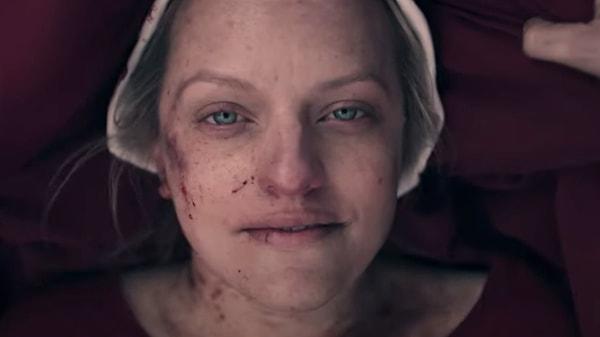
Courtesy of Hulu
We spent five years watching June toil under the weight of her position, so desperate for relief she probably lived on the cusp of committing suicide. Lydia has seen that countless times, the pained look, the mental anguish, and all of the suffering that comes from being beaten and violated. She knew what her girls faced, and now she can no longer look away. She's going to help them, no matter what.
Does that mean she'll be redeemed? Not in everyone's eyes. She will never be a normal, everyday American woman. She might continue hurting her girls, but what she's doing now does matter. It is a necessary effort, and she is willing to go to extraordinary lengths to accomplish her goal.
We also have to remember that the books and the series have diverged. This new Lydia is forgiving and kind. She's willing to hang up her cattle prod, and she cares. That's not something we saw in the book. That Lydia would put up a pretense of militancy and aggression to protect herself. This new woman is softer, more gentle, and loving. Love wasn't a part of the equation before. In the book, it was about anger, revenge, and the general direction of the country. That does change things.
This last season was about choosing love over violence and the negative effect that violence can have on a person. When June killed Fred she set off a well-researched physiological process that causes obsessive thoughts, uncontrollable urges, and homicidal ideation. It was almost as painful for us to watch as it was for her to experience that. The show's creators are idealists. They want us to know that anger and malice have no place in the fight against Gilead, and they've said so.
The final season will be about the ways the characters choose to fight and the ramifications of doing so. Will they choose malice and hatred, or will they fight with love? That might seem a little too sugary, but if you've read The Testaments, you know that activism in the future of this world will center around mercy and social work.
People will suffer under the regime. They'll need refuge, resources, and compassionate care. In the book, Lydia couldn't be relied upon. She did try to assist girls in need when she could, but there were also times when she'd act against them. She had an edge. Now that she's driven by a need to help, it will be interesting to see her style going forward.
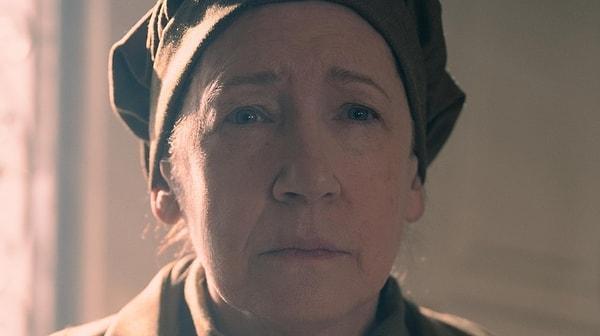
Courtesy of Hulu
What Will 'The Testaments' Be Like?
So many fans have voiced their concerns about the discrepancies between the series and 'The Testaments.' They say that the show has gone so far off course that it's impossible to imagine the spin-off working. First, it's 15 years in the future, and it's really not that different. The main plot points in the novel can play out onscreen seamlessly. Even Hannah's age, which has come up time and time again, matches with the novels. That's not by accident.
Bruce Miller has been planning the spin-off with Margaret Atwood since the first season, so there is a well-defined plan--or at least a general direction he wants to take things in. In the writing world, there's something called the plotter/pantser spectrum. True plotters plan out everything, well beyond what we would see onscreen. They don't type a single word until they have everything outlined. Pantser sit down at the computer, start pressing keys and fly by the seats of their pants. They will improvise entire novels and films that way, and it works. Some of the biggest writers in modern America are pantsers. Bruce isn't a full pantser, but he's close. That's why it doesn't always seem like things will work. He defines main plot points, and he typically sticks to them. He'll have a script made, map out scenes on a storyboard, and he'll also let actors improvise and choose their own lines.
He hasn't decided everything that will happen in 'The Testaments.' He does have a plan, but the finished product might not look anything like what he has envisioned. When he first started on the series, people would tell him to leave it as is. They'd say that it was already a work of art. It's best not to touch it, but anyone who has read the original book knows why he'd want to fill in the gaps. The ending is so dissatisfying it's no wonder they created a fireproof edition. He sees Margaret Atwood's second novel as the sequel to the first book. But he wants to turn the spin-off into the sequel to his series. He's not married to everything that happens in novel. We may or may not see Luke and Nick. He's hinting that June will have a larger place in the story. He hasn't decided. We could even see a war. Who knows? Personally, I hope he wraps up the book in the first season and moves on to the events that occur in the epilogue.
Keşfet ile ziyaret ettiğin tüm kategorileri tek akışta gör!

Send Comment